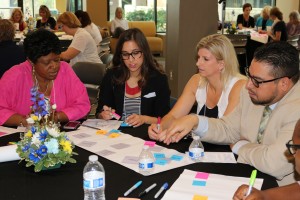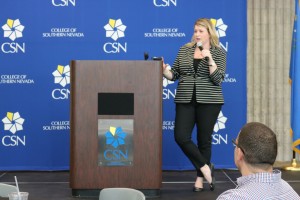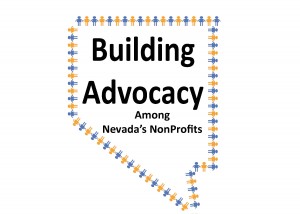In late June, the Guinn Center hosted a workshop, “Building Advocacy Capacity among Nevada’s Nonprofits,” which was cosponsored by the College of Southern Nevada. Approximately 70 participants from almost 50 nonprofits around the state attended the event.
As part of the workshop, the Guinn Center administered an informal survey asking attendees about the extent to which their organizations collaborated with each other, applied for grants, communicated with their legislators, and used data effectively to advocate and raise awareness about the needs they are addressing.

The results of the survey show many nonprofits are struggling in two key areas: grant writing and the meaningful collection and analysis of data. Approximately 43 percent of respondents said that their nonprofit had not successfully applied for a state and/or Federal grant in the last 12 months, and 30 percent said that they had not applied successfully for a local (or national) private foundation grant in the last 12 months. Nearly 37 percent of respondents said they would be interested in attending workshops on grant writing.
Another key area for growth among nonprofits was data. Many participants said that finding and using data, as well as tracking their own data, often hinders efforts by their organizations to apply for government and private grants. Approximately 65 percent of survey respondents said that their nonprofits did not know where to find relevant, current data to use in grant applications. Similarly, 65 percent of survey respondents said that their organizations do not use comprehensive data to inform the scope and delivery of services.
In addition, many nonprofits have had little to no involvement in the legislative process. Slightly more than half (53 percent) of survey respondents said that they or someone from their nonprofit had testified during the last legislative session on proposed legislation related to their organization or the community they serve either once or not at all. Only slightly more than one-third (37 percent) reported that their nonprofit has reached out to a legislator or elected official about their organizations’ work. At the workshop, longtime lobbyist Erin McMullen presented information on the legislative process, while UNLV Boyd School of Law Associate Professor of Law and Director of the Small Business and Nonprofit Legal Clinic Eric Franklin discussed strategies for nonprofits to advocate without jeopardizing their tax-exempt status.

Nonprofits looking for information on possible legislation that will be considered in the upcoming 2017 legislative session should visit the Bill Draft Request List on the Nevada Legislature website or contact the Legislative Counsel Bureau. The Legislature also provides the names and contact information for all current members of the Assembly and Senate.
Finally, for nonprofits looking for tools and strategies to bolster their data sets, several resources are available:
- The National Center for Charitable Statistics seeks to “develop and disseminate high quality data on nonprofit organizations and their activities for use in research on the relationships between the nonprofit sector, government, the commercial sector, and the broader civil society.”
- The National Council of Nonprofits collects research to help nonprofits improve operations and impact.
- Stanford University’s Nonprofit Management Institute recommends nonprofits create performance reports based on their SEC filings and use new tools from Root Cause and GiveWell to analyze social impact.
- The Nonprofit Hub, an online community for nonprofit education, says “stories” or qualitative data can also help communicate the organization’s reach in more memorable, user-friendly terms.
- The UNLV Center for Business and Economic Research publishes a Nevada-based report of the data collected by the Annie E. Casey Foundation’s KIDS COUNT Report. This data includes indicators on health, education, and economic well-being.
- Here in Nevada, the Guinn Center also offers survey design and quantitative and statistical analysis.
The Guinn Center will be hosting a similar workshop in Reno in September 2016.

